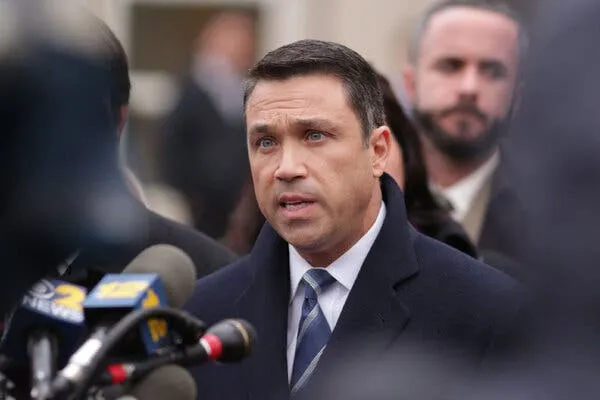Trump Issues Slew of Pardons Including Michael Grimm
In a move that has drawn both praise and criticism, former President Donald Trump has issued a series of pardons to Republicans who have faced legal troubles. One of the notable figures to receive clemency is Michael Grimm, the former U.S. Representative from New York, who pleaded guilty to tax fraud in 2014.
A Second Chance for Michael Grimm
Michael Grimm represented New York’s 11th congressional district, which encompasses Staten Island and parts of Brooklyn, before his legal troubles derailed his political career. After pleading guilty to tax evasion in 2014, he served nearly a year in prison. His case garnered significant media attention, particularly for the dramatic circumstances surrounding his guilty plea and subsequent conviction, which included allegations of a failed seafood restaurant business and unpaid taxes.
On December 23, 2020, as part of a broader effort to address what he termed “injustice,” Trump granted Grimm a full pardon. In a statement released following the pardon, Grimm expressed gratitude, saying it was “a long road, but I remain hopeful for the future.”
Trump’s Pattern of Pardoning Political Allies
This pardon is not an isolated incident; it is part of a larger trend during Trump’s presidency where he has shown a tendency to use the power of clemency to reward those who have displayed loyalty to him. From former campaign aides to controversial figures in his orbit, Trump’s presidential pardons have often reflected his values and priorities.
Grimm’s pardon follows other high-profile clemency decisions, including those for former Sheriff Joe Arpaio and 2016 campaign aide George Papadopoulos. Critics argue that such moves undermine the legal system and demonstrate a dangerous precedent where political loyalty supersedes accountability.
Reactions from Political Circles
The clemency granted to Grimm sparked varied reactions across the political spectrum. Supporters of Trump and Grimm hailed the decision as a corrective measure that restores justice, arguing that Grimm’s sentence had been disproportionate to his crime. They emphasize his commitment to public service and his dedication to his constituents.
On the other hand, critics, including some Democrats and legal analysts, condemned the pardons as emblematic of a judiciary being undermined by political motives. They worry about the implications of using pardons to reward loyalty rather than to right genuine wrongs within the judicial system.
Grimm’s Political Aspirations Following Pardons
Grimm has made no secret of his desire to reenter the political arena following his release from prison and subsequent pardon. He has hinted at potential future candidacy, suggesting that he wishes to once again represent the people of Staten Island. His supporters have rallied behind him, claiming that the criminal charges were politically motivated.
In the context of a political landscape increasingly defined by hyper-partisanship, the potential for Grimm’s political resurrection raises questions about the criteria through which candidates are evaluated. Voter sentiment appears split, with some segments ready to welcome him back, while others express skepticism given his legal history.
The Broader Implications of Trump’s Pardons
Trump’s broad usage of presidential pardons has cast a focus on the role of such power in the American political system. Historically, presidents have used pardons sparingly and responsibly. However, as Trump has shown, the potential for clemency to be used as a political tool can blur ethical lines and erode public trust in the executive office.
Legal experts are increasingly cautioning against a dynamic where presidential pardons are viewed as rewards for political allegiance. This raises the critical question: What does it mean for democracy when those in power can garner leniency based not on justice but on loyalty?
Conclusion: A Moment of Reflection for American Democracy
As Michael Grimm’s story unfolds in the post-pardon era, it becomes crucial for the public and policymakers to reflect on the implications of such decisions on the judicial system and the ethos of American democracy. The instances of pardoning raise important philosophical questions about justice, redemption, and the meaning of accountability in a political culture that is becoming increasingly transactional.
While clemency can play a vital role in correcting judicial mistakes, when it is perceived as a manipulation of power, it can lead to a systemic crisis of trust. Going forward, the challenge remains for American leaders to uphold the integrity of the legal system while navigating the intricacies of political loyalty.







